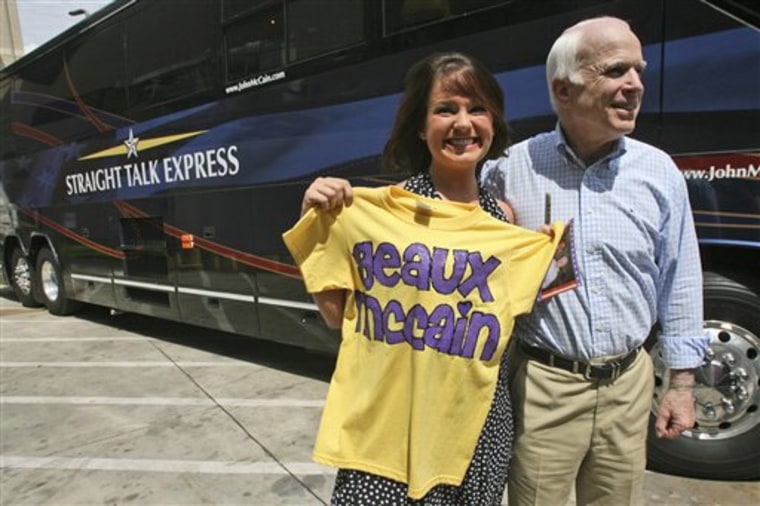Beau Underwood is putting his faith in politics.
He's a 22-year-old at the University of Chicago Divinity School, an active member of the Disciples of Christ and — in his spare time — he's showing candidates that the path to political righteousness doesn't always veer right.
Underwood and a growing number of other young, left-leaning believers are entering the political arena as campaign aides, lobbyists, grass-root activists and engaged voters.
They are trying to expand the focus of faith-based politics beyond the religious right's hot-button issues of abortion and gay marriage. And they are placing social justice issues, like poverty and war, at the intersection of their moral and political decision making.
"The religious voice in politics is not one unified voice," said Underwood, a self-described moderate who has worked as an aide on several Democratic local and congressional campaigns in his home state of Illinois.
"There are times when the media paints a very narrow picture of the religiously minded voter as being very conservative and fundamentalist," Underwood said. "People and groups who don't fit that stereotype aren't given the same amount of attention."
But this election year the tide may be turning. Liberal, religious voters are making their voices heard. And the youngest voices are often the loudest, as a new generation of believers begins to reshape the public discourse on faith in America.
'Major shift under way'
"In three decades I've never seen this sort of student-youth involvement," said Jim Wallis, author of the best-seller "The Great Awakening." "I do think there's a major shift under way."
The shift of young faith-based voters both dramatic and complex. "They're leaving the Republican Party in droves, but they're not automatically Democrats," Wallis said. "They're not going to jump in the pocket of the Democratic Party the way they did with the Republican Party."
A study in February by the Barna Group, a firm specializing in researching data on religion and society, shows the dynamism of this upheaval. It found 40 percent of likely born-again voters planned to vote Democratic this year, compared with 29 percent who planned to vote Republican. And, perhaps most surprising, large percentages of born-again and evangelical voters remain undecided compared with previous election years.
"The youth of America today is very divided," said Esther Winne, 18, a Christian conservative from Lancaster, Pa., who originally backed Mitt Romney for the Republican nomination but now favors Sen. John McCain. "I think we're looking for change. I think we're looking for something new. But I think people are looking in different places."
This is a notable change from the 2000 and 2004 elections, when the so-called religious bloc anchored GOP victories.
"The message of compassion and conservatism hasn't fallen on good soil," said Pastor Bill Devlin, president of Redeem the Vote, a nonprofit organization focused on engaging young believers in politics. "Young voters of faith don't see a genuine push from the Republicans to make that a reality."
Instead, many young faith-based voters are linking their religious callings with social justice efforts, such as quelling poverty and war.
"We're going to see a huge trend and shift as young voters of faith leave the Rs and move over to the Ds because they have a vision for social justice," Devlin said, adding that community service and outreach is at an all-time high among today's youth.
Wallis, an evangelical Christian who also runs Sojourners, a social justice community, said these young adults "want their faith to make a difference. They're asking the question of vocation more than of career."
'Faith can unite people across party lines'
This resonates with Underwood, who hopes to use his divinity school studies and political involvement as a vehicle for social change.
"The one thing that I do think that I'm called to do is to help bridge the gap between the moral voices coming from the church and the moral decisions being made by those running the government," Underwood said. "Faith can unite people across party lines."
That may help explain the strong following Sen. Barack Obama maintains with young faith-based voters of different denominations.
"The message that Barack Obama tends to have definitely appeals to people in my generation, especially people in the faith and justice movement," said Jon Gromek, a 22-year-old organizing associate at Network, a Catholic social justice group based in Washington.
Gromek, who favors Obama, majored in theology and political science and sees his faith-based social work as part of a larger generational shift. "There's a growing movement of people, especially youth, who are ready to work on these issues, whether from a political or social standpoint."
Part of this increased activism may be tied to technology.
"With the advent of 24-hour media it's easier to see the injustices, and it's very easy to see how these injustices affect everyone," Gromek said. The result is a generation of young people finding new callings and new, dynamic issues to engage in tandem with their religious pulls.
"This is the most globalized generation we've ever had," Wallis said. "They're not just stuck in an American framework. They talk to people around the world, they go to places around the world — which is changing their politics and changing their faith."
